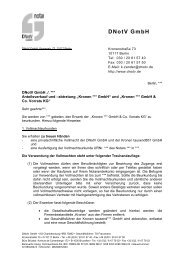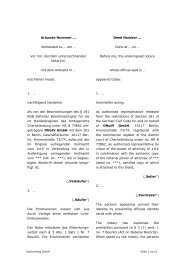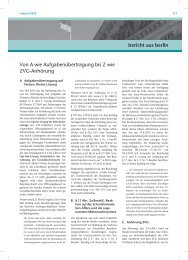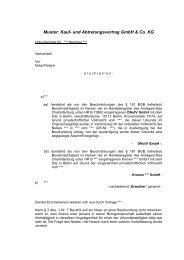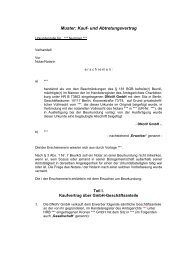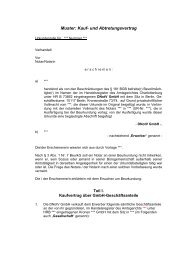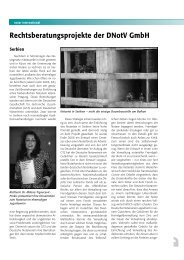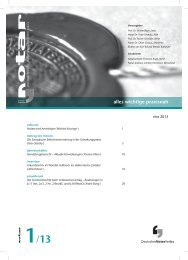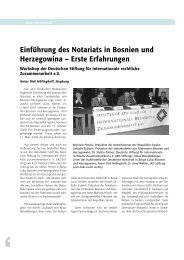notar Umbr_2.02 - Deutscher Notarverein
notar Umbr_2.02 - Deutscher Notarverein
notar Umbr_2.02 - Deutscher Notarverein
Erfolgreiche ePaper selbst erstellen
Machen Sie aus Ihren PDF Publikationen ein blätterbares Flipbook mit unserer einzigartigen Google optimierten e-Paper Software.
38<br />
<strong>notar</strong> europa<br />
The advantages of clear and simple<br />
rules are quite evident e.g. comparing<br />
the continental system of accountancy<br />
to US-GAAP. In US-GAAP<br />
questions of accountancy are often<br />
discretionary (e.g. booking of discontinued<br />
operations, restructuring reserves,<br />
special purpose entities, issuance<br />
of stock in exchange for notes<br />
receivable or mark to market accounting,<br />
cf. Herdman loc. cit.). These rules<br />
which practically leave the decision<br />
between two or more alternatives to<br />
the discretion of the company lead to<br />
enforceability neither in penal nor in<br />
civil law.<br />
The disadvantages of the system of<br />
legal capital lie (i) in its inflexible structure<br />
and (ii) in the often difficult procedures<br />
of financing of an enterprise.<br />
The inflexibility is no major problem<br />
if the threshold for newcomers is<br />
not too high. The difficulties of financing<br />
are often a problem of the repertoire<br />
of capital measures provided in<br />
the national Company Law. E.g. there<br />
is no authorized capital in French Stock<br />
Corporation Law. Thus, an extraordinary<br />
meeting is required to increase<br />
the share capital in any case with detrimental<br />
effects for French companies<br />
to make the most of actual favourable<br />
conditions of the capital market.<br />
As a result, we prefer the system of<br />
legal capital. It may be often inadequate<br />
and alternatives conceived in<br />
theory may often look brighter. But the<br />
world we live in, with human beings<br />
being sometimes dishonest and apathetic,<br />
does not always offer a place for<br />
all ideas of the realm of academic theory.<br />
[…] We emphasized the ”threshold<br />
function” of legal capital. With the<br />
concept of a corporation the law offers<br />
the possibility of personal liability limited<br />
to the assets of a fictional entity in<br />
case of insolvency. This privilege<br />
should not be offered at any price. This<br />
is also a major issue of consumer protection,<br />
because in case of insolvency<br />
also consumer rights (e.g. refund of<br />
down payments, fulfilment of representations<br />
and warranties) are in danger.<br />
In Germany the acquisition of own<br />
shares is in principal a taboo after the<br />
horrible experiences of the crash of<br />
1929 and the consequences it had for<br />
the political system in this country.<br />
Therefore the question is delicate.<br />
Since 1998 restrictions have been<br />
eased. At the present stage it is too<br />
early for conclusions. Especially the<br />
spectacular cases in the New Market<br />
are yet to be assessed if the acquisition<br />
of own shares has been abused<br />
to manipulate exchange rates.<br />
Also, ”pre-emptive rights” of the<br />
shareholders (probably in the meaning<br />
of rights of first refusal to subscribe<br />
for new shares) are assessed differently<br />
in the Member States. In Germany,<br />
any regulation of subscription<br />
rights always implies questions of the<br />
guaranty of personal property in the<br />
Constitution of the Federal Republic<br />
(Art. 14).<br />
We consider the principle of ”one<br />
share one vote” as fundamental in<br />
Company Law. Golden shares or multiple<br />
voting rights per share are obstacles<br />
to an efficient capital market, in<br />
particular to an efficient market of corporate<br />
control, and should be abandoned<br />
(cf. Court of Justice of the European<br />
Communities: judgements of<br />
4 June 2002, cases C-483/99, C-<br />
503/99, C-367/98).<br />
[…]<br />
Mobility<br />
The famous debate between incorporation<br />
doctrine and real seat doctrine<br />
is deeply routed in the civil law<br />
system of the different states. When<br />
the High Group considers the real seat<br />
doctrine as a ”disproportionate inhibition<br />
of commercial freedom and legal<br />
security” this argument is as well pure<br />
rhetoric as well denying that both concepts<br />
serve the purpose of legal security<br />
in their correspondent legal surroundings.<br />
The choice between the two systems<br />
is largely influenced by the available<br />
legal remedies in a certain state<br />
such as in rem jurisdiction, piercing<br />
the corporate veil and direct liability of<br />
the management towards the shareholders<br />
or discovery procedures. E.g. a<br />
country without in rem jurisdiction or<br />
with only a theoretical chance of piercing<br />
the corporate veil like Germany will<br />
have to take into account severe sideeffects<br />
on its whole law system. Moreover<br />
the question is also an issue of<br />
consumer protection.<br />
So finally the issue is directly related<br />
to the preventive or litigious approach<br />
of a Law System, hence to the<br />
different ways to build up a civil society<br />
the legal culture being its substantial<br />
part.<br />
As a matter of fact, justified reasons<br />
for a cross-border change of corporate<br />
domicile are not yet obvious.<br />
There is no provision in tax law permitting<br />
to avoid a taxable profit of liquidation.<br />
Therefore under normal circumstances<br />
a subsidiary is set up instead<br />
of the domicile being changed.<br />
It is remarkable that all the cases which<br />
have gone to court have been a little<br />
”smelly”. In the German case ”Landshuter<br />
Druckhaus Ltd. & Co. KG” (of the<br />
Supreme Court of Bavaria) a German<br />
owned general partner in form of a UK<br />
Ltd. was used in a German Limited<br />
Partnership for the only purpose to circumvent<br />
the provisions on workers’<br />
participation. In the ”Centros” case of<br />
the European Court of Justice the Danish<br />
owned British corporation should<br />
serve as a legal entity for slippery financial<br />
operations in Denmark. In Ireland<br />
and the Netherlands the incorporation<br />
doctrine is used to slip through<br />
holes of International Tax Law. Perhaps<br />
this is the reason why the European<br />
Court of Justice as yet did not make up<br />
its mind expressly.<br />
The draft of the 14 th Company Law<br />
Directive provides a fair compromise<br />
between the two theories as well as<br />
Art. 8 of the Council Regulation No.<br />
2157/2001 does.



